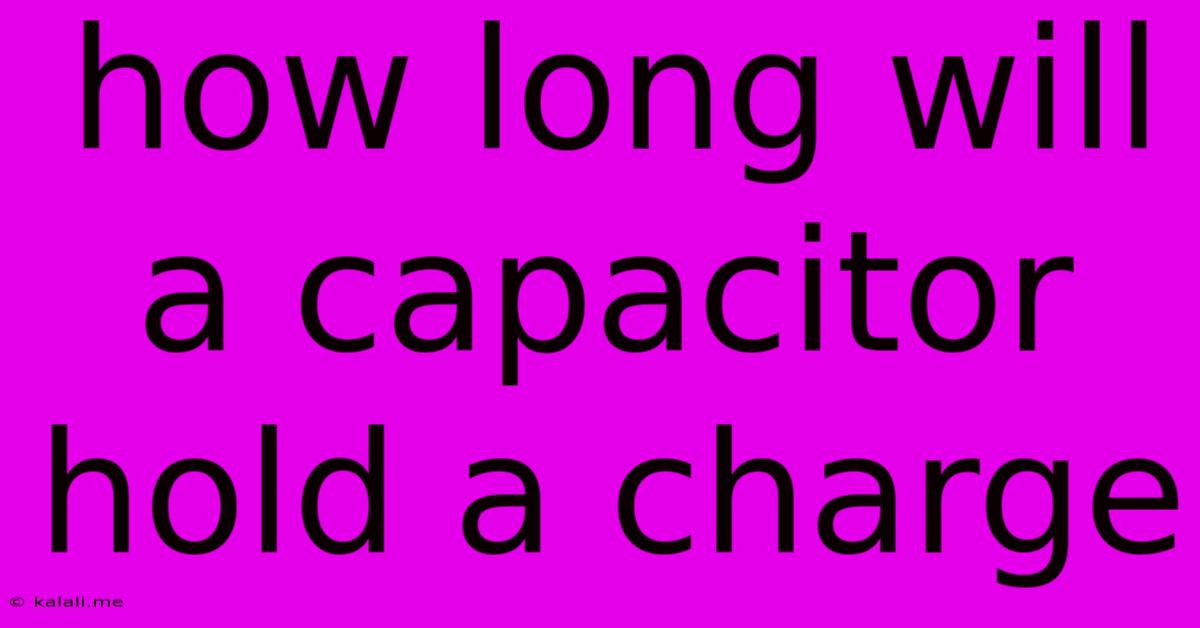How Long Will A Capacitor Hold A Charge
Kalali
May 27, 2025 · 3 min read

Table of Contents
How Long Will a Capacitor Hold a Charge? A Deep Dive into Capacitor Discharge
How long a capacitor holds a charge isn't a simple yes or no answer. It depends on several factors, making it crucial to understand the physics behind capacitor discharge and the practical implications for various applications. This article will explore the variables influencing charge retention and provide you with the tools to estimate discharge time for your specific needs.
Understanding Capacitor Discharge:
A capacitor stores electrical energy in an electric field between two conductive plates separated by an insulator (dielectric). When a capacitor is charged, electrons accumulate on one plate, creating a potential difference (voltage) between the plates. The rate at which a capacitor discharges is determined by the capacitor's capacitance (C) and the resistance (R) of the discharge path. This relationship is governed by the RC time constant, often represented by the Greek letter tau (τ).
The RC Time Constant (τ = R x C):
The RC time constant represents the time it takes for the voltage across the capacitor to fall to approximately 37% (1/e) of its initial value. This isn't the time it takes to completely discharge, but rather a key characteristic of the discharge curve. A larger RC time constant signifies a slower discharge, while a smaller one indicates a faster discharge.
- Capacitance (C): Measured in Farads (F), capacitance describes a capacitor's ability to store charge. Larger capacitance means more charge storage and a slower discharge.
- Resistance (R): Measured in Ohms (Ω), resistance represents the opposition to current flow in the discharge path. Higher resistance leads to a slower discharge.
Calculating Discharge Time:
While the RC time constant gives a good initial estimate, a capacitor never truly reaches zero voltage. The voltage decays exponentially. To calculate the voltage at a specific time (t), we use the following formula:
V(t) = V₀ * e^(-t/RC)
Where:
- V(t) is the voltage at time t
- V₀ is the initial voltage
- e is the mathematical constant (approximately 2.718)
- t is the time elapsed
- R is the resistance
- C is the capacitance
This formula allows for precise calculation of the voltage remaining at any point during the discharge process. To determine the time it takes to reach a specific voltage, you'll need to rearrange the formula.
Factors Affecting Charge Retention:
Beyond the RC time constant, several other factors influence how long a capacitor holds a charge:
- Leakage Current: Even with a perfect insulator, a small leakage current can flow through the dielectric, slowly discharging the capacitor. This is particularly relevant for electrolytic capacitors, which tend to have higher leakage currents.
- Temperature: Temperature variations can affect the dielectric properties, potentially influencing leakage current and discharge rate. High temperatures often accelerate the discharge process.
- Dielectric Material: Different dielectric materials have varying levels of insulation resistance, affecting leakage current and charge retention.
- Capacitor Quality and Age: Higher-quality capacitors generally exhibit lower leakage currents and maintain their charge for longer periods. Older capacitors may experience degradation, leading to increased leakage and faster discharge.
Practical Implications:
Understanding these factors is critical in various applications:
- Power Supplies: Capacitors in power supplies help smooth out voltage fluctuations. Their discharge time influences ripple voltage and overall performance.
- Timing Circuits: Capacitors are used extensively in timing circuits, where precise control over discharge time is crucial.
- Energy Storage: In some applications, capacitors serve as energy storage devices. Understanding their charge retention is vital for determining their suitability.
Conclusion:
The length of time a capacitor holds a charge is not fixed but depends on several interconnected factors. The RC time constant provides a fundamental understanding, while considering leakage current, temperature, dielectric material, and capacitor quality offers a more comprehensive perspective. By carefully considering these variables, you can accurately predict and control the discharge behavior of capacitors in your applications.
Latest Posts
Latest Posts
-
How To Take A Photo Of A Screen
May 28, 2025
-
How Long Does A Water Pump Last
May 28, 2025
-
What Is The Difference Between Jehovahs Witness And Mormon
May 28, 2025
-
How To Delete A Folder In Google Drive
May 28, 2025
-
How Do You Measure The Torque Of A Motor
May 28, 2025
Related Post
Thank you for visiting our website which covers about How Long Will A Capacitor Hold A Charge . We hope the information provided has been useful to you. Feel free to contact us if you have any questions or need further assistance. See you next time and don't miss to bookmark.